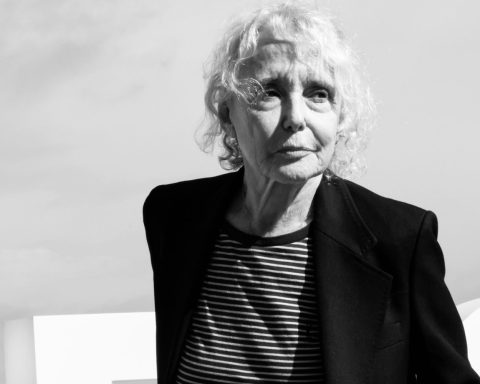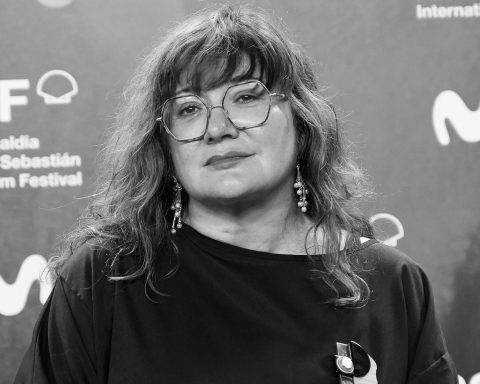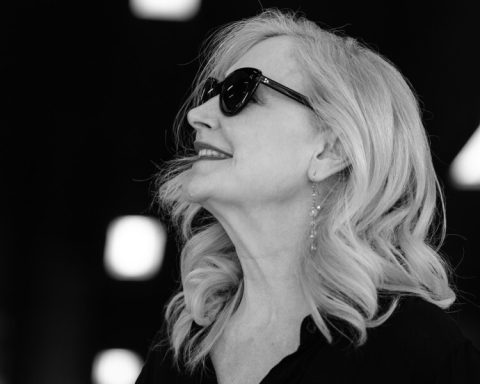French filmmaker Mia Hansen-Løve has made eight feature films, rising to international prominence in 2014 with her fourth, Eden. She has since made four critically acclaimed films including Things to Come for which she won the Silver Bear for Best Director at the 2016 Berlin International Film Festival, as well as Bergman Island and One Fine Morning, both premiering in Cannes in 2021 and 2022 respectively.
But her first real encounter with Cinema was when she was cast in Olivier Assayas’ 1998 film Late August, Early September. She then acted in another of his films, Sentimental Desires and began a relationship with him. However, Hansen-Løve wouldn’t call herself an actress. “It was a very limited experience. What I mean is that it’s really not too much if you compare it to the eight films I’ve done, so I don’t feel like I’m this actress turned into a director. I rather feel that I’m a director who had a very short and interesting experience as an actress,” Hansen-Love tells Fade to Her.
It wasn’t merely about the experience of being on set for her, and watching a director work and the excitement that came with it, but it was also about the sense of liberation it gave her; an emancipation of sorts that felt like she had been given wings. “It obviously had to do with acting and being filmed, of course, because that’s what I was doing. But I think it also had to do with just the power of fiction, becoming aware of how it could help you find out who you are,” she shares.
Indeed, she was lost at seventeen and didn’t know what she wanted to be. So, finding out who she was or having another perspective on her own life and living in this other world called “fiction” was a very powerful and transformative experience for Hansen-Løve. It also made her watch films more. “I was still young. I wasn’t a cinephile really before I played in films. I became [it] around that age, but that was progressive. I wasn’t a film buff who had seen hundreds of films. It wasn’t like that. But after being in the [two] films, that’s when I really started watching films,” she recalls.
At the beginning of February, Hansen-Løve held a masterclass at the 2024 Clermont-Ferrand International Short Film Festival. But with only two short films under her belt, she is not a short film person at all. She thought her life was going to be very short – pun unintended – and that she didn’t have much time, thus becoming only interested in telling longer stories. There has always been something urgent about Hansen-Løve – not enough time, but the drive to tell stories connected to or dealing with its passing. “It really has to do with my inspiration,” she explains.
But inspiration failed her when it came to short films although she concedes that exceptional short films have been made throughout Film History since its inception more than a hundred years ago, “I only had ideas for features,” she explains. The two shorts she did make in 2004 were very modest in her opinion. Un pur esprit is a four-minute black and white mute portrait of a young girl. “I don’t really know where they came from, but all I know is that when I made them, I already wanted to be a filmmaker. But I wanted to write features. And I knew that I could not just start with a feature or it would have been very difficult. And, suddenly, there was this one idea and then this other idea, so I made those very, very simple short films and it was great to learn how to [make them] because I didn’t know anything about filmmaking,” she says.
And learn Hansen-Løve did. But not at film school. She had already attended a demanding school and rejected the obsession with working, studying and “making it.” For her, making films was about escaping this lifestyle and mindset. First of all, she wasn’t confident enough to take the entrance exam to the renowned Parisian film school La Fémis and second, the very idea of Cinema for her was quite the opposite, so she couldn’t very well imagine herself going to film school. But she was aware of her lack of cinematic knowledge, so she did what any intellectual aspiring filmmaker would do, which was to write for Les Cahiers du Cinéma. “They were very generous to hire me. I wrote a few texts for the website. They were open and, at that time, there was still this idea of Les Cahiers being a place to not only to write on film, but also to become a director. They still had this heritage. Honestly, I could hardly write anything. It was very difficult for me to write any review. But I tried to learn and I think I never really learned [to write them],” she admits.
Unlike many of her fellow filmmakers who have a deep appreciation for the short form as it allows them to experiment with the format and gives them more freedom and endless possibilities, Hansen-Løve has, for her part, always been a “features only” kind of director. “Still, at that time, I already had another story that I really wanted to write [for a feature],” she recalls. For her, shorts were never synonym to freedom because she never had a producer. “I was nobody. I had no money. So, I found it much more difficult to find producers for my short films than for my longer films, which means that some people are really meant to do something and some people aren’t meant to do other things. And I think I really was never meant to make short films,” she asserts, adding: “I wasn’t like those directors who make ten short films, while their short films are really part of their body of work, and who are really exploring this brevity like something interesting. For me, it was just something that I tried to do to proceed to the transition to features as quickly as possible.”
Again, Hansen-Løve was in a hurry because she felt the need to tell her stories, convey her life experience to the big screen as quickly as possible. As a matter of fact, her films are very much about the real world, relationships, existential crisis and the search for one’s self. “All my films up until now and probably all of them in the future, I guess, will always speak about my experience of life, which can sound very banal, but it’s not necessarily, because I think some directors are looking for something else. For instance, some tried to make a fantasy world, the world of tomorrow that they imagine or to work with their fantasy, their imagination, and work in a different way [in order] to make films and show the possibilities of Cinema,” Hansen-Løve claims.
But her work, according to her, is precisely what working on the possibilities of Cinema and exploring what Cinema has to offer means, “What inspires me the most regarding what you can do with Cinema is to recreate life somehow,” she affirms.
Moreover, Hansen-Løve says she likes to think she recreates the feeling of reality in a way that her films give a feeling of truth. “It’s always a reinvention. Because reality is chaos. And when you write a film that’s supposed to be realistic, actually, you have to put a frame on the scales and choose what you want to tell and it’s always a reinvention. So, it doesn’t even exist. Reality, is always very subjective. There will never be just one reality.”
In that sense, she admits that a lot of the choices she makes, not only about the subject of films, but also on how she films them or how she uses music, have to do with the desire to transmit a feeling of life where life is bigger, “I think life is bigger than Cinema. And I think saying this doesn’t mean that I don’t believe in Cinema. I totally believe [in it]. I mystically believe in the power of Cinema, but as a way to recreate this feeling of life and keep a trace of reality in a way that doesn’t let the void destroy your memories and the presence of the people you love. To me, Cinema is the best way to fight against the void,” she shares.
When asked about the situation of women in film today, Hansen-Løve is optimistic. Even though she thinks the situation is much better for female directors now than it was a decade ago, as it is much easier for a female first-time director to make her film, than it is for a man, “Right now, maybe it’s just my feeling or maybe I’m being too optimistic, but I really think that people have gotten very, very sensitive about those issues, which is probably a great thing, but I think that there is a lot of attention and respect and curiosity for women directors. And that wasn’t like that,” she explains.
In fact, she deems her writing to have always been very feminine in many ways, which is something that would not have helped her in the past. In that regard, the situation has improved as it was a characteristic that was not considered necessarily positive fifteen or twenty years ago, or would have been as respected or relevant as it is today. “Just to give you an example. It was more than ten years ago, and the director of a film festival did an interview where he said – I don’t remember why and how he ended up saying this – but he didn’t like my films because he thought they were too ‘girly.’ It was the fact that he would say that in an interview and that he would feel at ease to say that and all the things that it says in the subtext of this, I think, really said something about the times we were in. And when he said that about my films and some other programmers at other festivals had said actually something quite similar a couple of months ago. That was after Goodbye First Love. These people were talking about my first three films and so, they felt they were too ‘girly.’ I mean, today, I’m not saying they would like these films better, but I think if they like or don’t like a film, they wouldn’t say it’s because it’s too ‘girly,’ or they would have to explain what they actually mean. So, that tells you how much the time have changed,” Hansen-Løve comments.
Kelly Reichardt is one of her favorite contemporary female directors, one that she cites as an inspiration, “I really love her work. I’ve been following what she’s doing for many, many years now. And there is something about her minimalism, her way of paying attention to her characters, to nature, her patience, the pace of her films, the quietness of her films, how restrained they are. There’s something about her writing that I’m extremely sensitive to. Wendy and Lucy, for instance, one of her early films, is a film that has really marked me; I wouldn’t say influenced, but has certainly impressed me a lot when I saw it,” she concludes.
Photo credits: Courtesy of the Clermont-Ferrand International Short Film Festival.
This interview was conducted at the 2024 Clermont-Ferrand International Short Film Festival.









